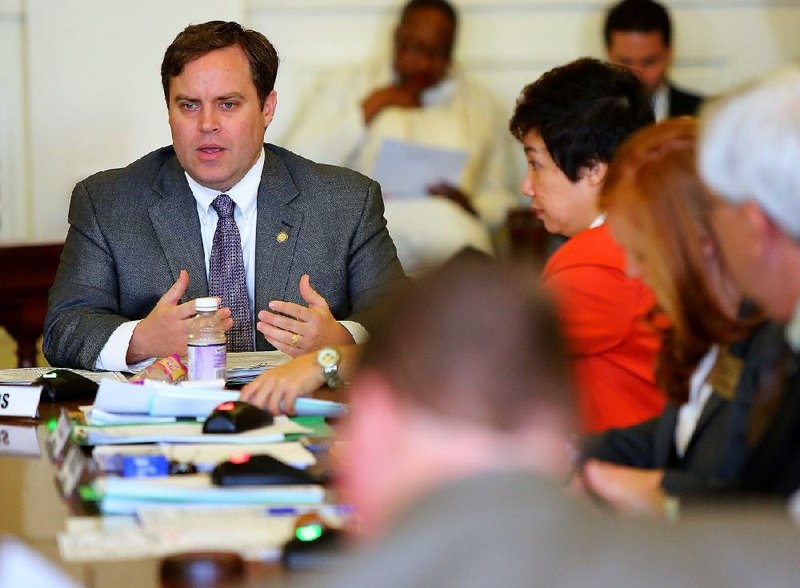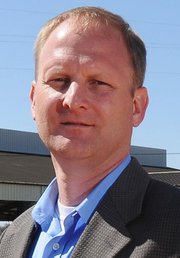FAYETTEVILLE -- A judge ruled Friday that federal prosecutors can use about 40 secretly recorded telephone calls in the case of a former state senator accused in a kickback scheme involving state grant money.
Jon Woods is accused in a federal indictment of taking kickbacks in return for directing state General Improvement Fund grants to certain recipients. Oren Paris III of Springdale, president of Ecclesia College, is accused of paying some of the kickbacks. The college passed its kickbacks through a consulting firm owned by Randell Shelton Jr. of Alma, the indictment says.
Part of those fees went to Woods and to then-state Rep. Micah Neal, according to the indictment. Both are Republicans who represented Springdale. Neal pleaded guilty to one count of public corruption Jan. 4.
Woods is charged with 14 counts of wire fraud, one count of mail fraud and one count of money laundering. Paris and Shelton are named in 13 of the wire-fraud counts and a count of mail fraud. The three are set for a two-week jury trial beginning Dec. 4.
Woods asked in a motion filed under seal for a hearing on the secret recordings. The motion sought to keep prosecutors from using the recordings at his trial. U.S. District Judge Tim Brooks denied the motion Friday.
Woods contended the calls were recorded between June 18, 2016, and later that year by a defendant in a separate but related case and at the government's direction. That person was Neal, according to other court documents filed Friday.
Woods argued that the recordings violated his constitutional right to counsel because investigators knew he was represented by an attorney at the time.
Prosecutors agreed the recordings were made, but denied Neal was coordinating with them or under their direction. They also maintained there would have been nothing illegal or improper about coordinating with or directing the recording activities because "adversary judicial criminal proceedings" hadn't begun against Woods at the time the recordings were made.
"The court agrees with the government that, under controlling legal precedent, it would not have been a Sixth Amendment violation for the government to do exactly what Mr. Woods accuses it of doing," Brooks wrote in his order and opinion.
Brooks noted that the right to counsel comes into play only after formal charges are filed, a preliminary hearing is held, an indictment is handed down, criminal information is filed or a defendant is arraigned.
"None of those events had yet occurred at the time the recordings of Mr. Woods were made," Brooks wrote.
Woods also contended the move was a violation of the Arkansas Rules of Professional Conduct on the part of prosecutors. Brooks rejected that argument as well, citing an 8th Circuit Court of Appeals ruling saying the code isn't intended to stymie undercover investigations when the subject retains a lawyer.
In a related filing Friday, Gregory Payne, an attorney for Paris, filed a motion to suppress statements Woods made to federal investigators implicating Paris and some subsequent audio recordings. The motion was available online midafternoon Friday but was later sealed. At least five documents in the case have been filed under seal since the case was opened.
According to the motion, Woods told investigators he was involved in a kickback scheme involving General Improvement Fund money and Paris had full knowledge and was an active participant.
"Through discovery, however, counsel for Dr. Paris has become aware of the true nature of the transaction that varies substantially from the scene taken at face value," according to the motion. "In an audio recording made surreptitiously of a subsequent conversation between Jon Woods and Arkansas state Representative Micah Neal by Mr. Neal, Mr. Woods discussed the somewhat less than harmonious circumstances under which he gave his Nov. 11, 2015, testimony to the government."
Woods in a recorded call told Neal his attorney, W.H. Taylor, repeatedly exhorted him to tell the truth during the interview. The motion goes on to contend Woods was coerced to implicate Paris by federal investigators and Taylor. It questions whether Taylor had a conflict of interest because he also represented an FBI agent, who was likely present during the interview, in a civil matter.
Taylor said Friday that it would be inappropriate for him to comment on the allegations in the motion.
The motion contends Woods' coerced statements led directly to the investigation resulting in Paris being indicted and, if the statements are thrown out, the government has no basis to prosecute Paris.
The motion also argues the government knew in advance Neal was going to record his conversations with Woods and allowed it to happen because it wasn't something they could legally do at the time, which would potentially be a violation of the rules of professional conduct.
The indictment doesn't give a total of what Woods is accused of receiving in kickbacks because portions of it were paid in cash, court documents say.
Paris paid Shelton's consulting company $267,000 out of college money from 2013 to 2015 without notifying his college's board until October 2015, according to the indictment. Shelton is described in court documents as a mutual friend of Paris and Woods.
Neal received $18,000 for his part in obtaining grants for the college and another $20,000 for obtaining a grant to another nonprofit group, according to his plea.
Ecclesia received $550,000 in improvement grants with the support of Woods, Neal or both. All the grants were issued from 2013 through 2014. Ecclesia received a total of $717,500 in improvement fund grants in 2013 through 2014.
The General Improvement Fund is state tax money left unallocated at the end of each fiscal year and interest earned on state deposits. Each legislator is given a share and can direct where he wants it to go as long as it goes to a nonprofit group or government entity.
The Arkansas Supreme Court heard arguments Thursday in a lawsuit seeking to end the practice of the lawmaker-directed grants to local projects.
Woods' defense attorney, Patrick Benca of Little Rock, said at a hearing in May that the government has indicated there will be other indictments forthcoming. U.S. Attorney Kenneth Elser didn't dispute the statement.
State Desk on 09/09/2017

